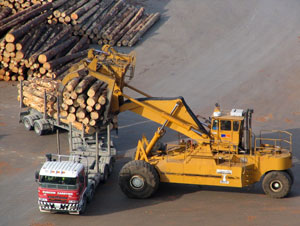Heavy Truck Driver
Tasks & duties

Heavy truck drivers may do some or all of the following:
-
carry out routine checks on their trucks every time they drive them
-
pick up the daily delivery instructions
-
make sure they understand the instructions and know the route
-
weigh the truck before and after it is loaded
-
supervise or help with the loading of the truck
-
check the condition of the load and that it is securely fastened
-
follow the correct safety procedures if the goods being transported are dangerous
-
handle livestock
-
check all the documentation related to the loads
-
drive a truck to make deliveries or pick up goods
-
keep a log book of the hours they work
-
carry out basic vehicle maintenance
-
run their own trucking business
Specialisations
Heavy truck drivers may specialise in a particular area of truck driving such as line haulage (city to city driving), rural driving, or driving trucks within a town or city centre.
Skills & knowledge

Heavy truck drivers need to have:
-
excellent heavy truck driving skills
-
knowledge of emergency procedures and how to identify and handle hazardous road conditions
-
first aid skills
-
knowledge of different methods of securing and covering loads such as tying different kinds of knots and using chains, locks and straps
-
an understanding of the Road Code, defensive driving techniques and relevant transport laws
-
knowledge of the area they work in and the correct routes to take
-
the ability to use satellite tracking equipment and on-board computers
-
skill reading maps
-
decision-making skills
Heavy truck drivers who are self-employed also need to have good business skills.
Entry requirements
To become a heavy truck driver you need to have a Class 2 licence. You can then progress through the licence stages to gain a heavy combination vehicle licence (Class 5). You must also pass a medical examination every 10 years, when you renew your licence. Some drivers are required to have a First Aid Certificate.
Further information on driver licensing is available from Land Transport New Zealand, which also provides a list of approved courses for occupational drivers.
If you carry hazardous goods, you need to have completed unit standards in dangerous goods, which can be done as part of a National Certificate in Commercial Road Transport.
Land Transport NZ website - information on transport service licences
Secondary education
There are no specific secondary education requirements, but useful subjects include School Certificate or NCEA equivalent maths and English.
Tertiary education
A National Certificate in Commercial Road Transport is useful for heavy truck drivers.
Training on the job
New drivers often accompany more experienced drivers until they learn the travel routes, and learn how to handle the various goods being carried. The new licence system means drivers often choose to train with a registered trainer, so that they can progress through the stages more quickly.
The National Certificate in Commercial Road Transport is available through Tranzqual ITO, the training body for the road transport and logistics industries.
Tranzqual ITO website - road transport and logistics industry training information
Useful experience
The best experience for this job is work as a truck driver's assistant. Other useful experience includes driving other heavy vehicles, or working on the docks, in warehouses or stores, or as a courier.
Video
Truck Driving Part 1
Truck Driving Part 2
Truck Driving Part 3
Log Transportation
From just a job on you tube
Related courses
Automotive Vehicle Operations
For more information, please refer to Career Services.
Document Actions
